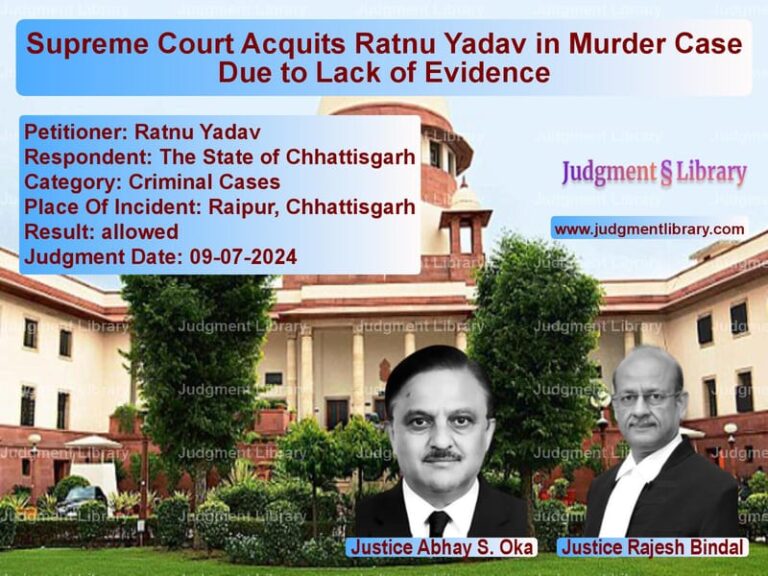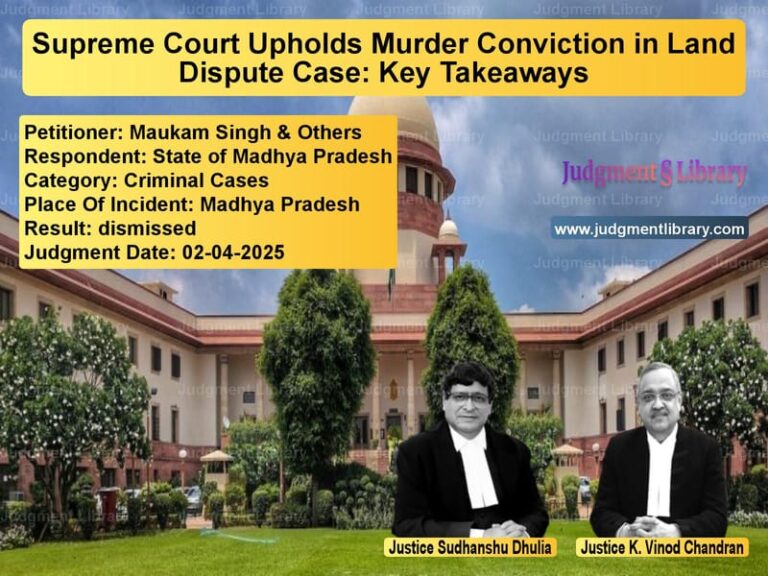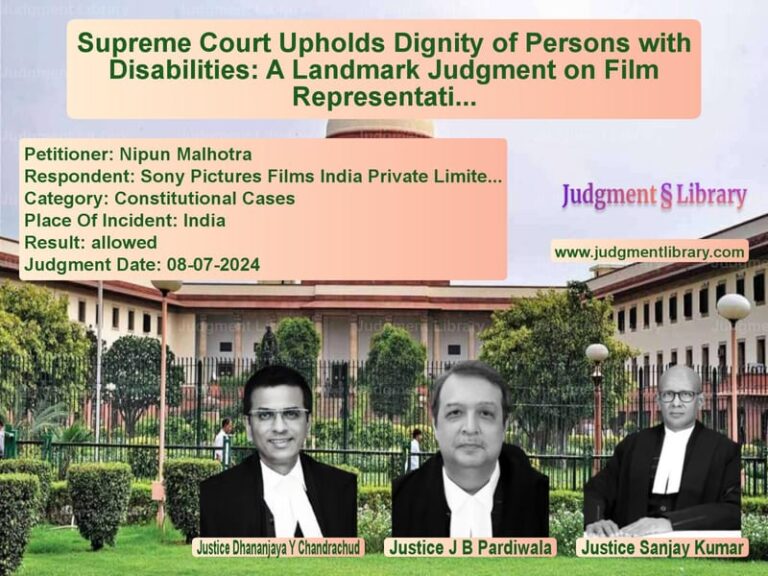Supreme Court Upholds Conviction in Murder Case: Common Object and Eyewitness Testimony Analyzed
The case of Postman Vengaisamy & Ors. vs. State Represented by Inspector of Police & Ors. is a significant ruling in criminal law concerning unlawful assembly, common object, and the reliability of eyewitness testimony. The Supreme Court upheld the conviction of the appellants, rejecting their appeal against their conviction for murder and related offenses under the Indian Penal Code (IPC).
The case involved a longstanding enmity between two villages, which led to a violent attack on the deceased, Chinnaperiaiyah. The prosecution argued that the accused had formed an unlawful assembly with the common object of murdering the deceased. The Supreme Court carefully analyzed the evidence, including eyewitness testimonies, medical reports, and the background of the case, before dismissing the appeal.
Background of the Case
The case revolved around two incidents, one on April 8, 2003, and the other on April 26, 2003, in Tamil Nadu. The sequence of events was as follows:
- On April 8, 2003, the deceased, Chinnaperiaiyah, and others were attacked by a group from the accused’s village.
- On April 26, 2003, the accused formed an unlawful assembly and attacked Chinnaperiaiyah with swords and other weapons, leading to his death.
- The prosecution presented multiple eyewitnesses, including Irulandi (PW-1) and Ramar (PW-2), who testified to the violent attack.
- The trial court convicted the accused under Sections 148, 302 read with Section 149 IPC and sentenced them to rigorous imprisonment.
- The High Court upheld the conviction, leading to this appeal before the Supreme Court.
Petitioner’s Arguments
The appellants, represented by their counsel, raised the following arguments:
- The prosecution witnesses, Irulandi (PW-1) and Ramar (PW-2), were unreliable and had been introduced later.
- The injuries on these witnesses were minor, and their testimonies were contradictory.
- The conviction was based on interested witnesses, and there was no independent corroboration.
- The prosecution had failed to establish a common object to commit murder under Section 149 IPC.
Respondent’s Arguments
The State, represented by the Inspector of Police, countered that:
- The eyewitness testimonies of PW-1 and PW-2 were consistent and corroborated by medical evidence.
- The accused were armed with weapons, which indicated a premeditated intention to kill.
- The events of April 8, 2003, provided a motive for the attack on April 26, 2003.
- The medical reports confirmed the nature of injuries inflicted on the deceased.
Supreme Court’s Observations
The Supreme Court, in its judgment delivered by Justices L. Nageswara Rao and Hemant Gupta, ruled against the appellants, making the following key observations:
Reliability of Eyewitness Testimonies
“The oral testimony of material witnesses Irulandi (PW-1) and Ramar (PW-2) is corroborated by the medical evidence, whereas the motive of taking life of the deceased is made out from the incident which happened on April 8, 2003.”
The Court found that the statements of the eyewitnesses were credible and supported by the forensic evidence.
Common Object of the Unlawful Assembly
“Since there is a history of earlier attack on the deceased on April 8, 2003, accused formed an unlawful assembly with a view to take the life of Chinnaperiaiyah.”
The Court ruled that the sequence of events indicated a clear intention to commit the murder.
Absence of Material Contradictions
“Some contradictions arise on account of perception of the witnesses and due to passage of time. But the credibility of the witnesses has not been shaken.”
The Court dismissed minor inconsistencies in witness statements, stating they did not affect the overall credibility of the prosecution’s case.
Final Ruling and Impact
The Supreme Court ruled:
- The conviction under Sections 148, 302 read with Section 149 IPC was upheld.
- The appeal was dismissed.
- The appellants were granted three months’ time to surrender before the competent court.
Legal Precedents Considered
The Supreme Court referred to key rulings, including:
- Ram Laxman vs. State of Rajasthan (2016) 12 SCC 389: Established that witness credibility should be assessed in totality.
- Najabhai Desurbhai Wagh vs. Valerabhai Deganbhai Vagh (2017) 3 SCC 261: Clarified the principles governing common object under Section 149 IPC.
- Mahendran vs. State of Tamil Nadu (2019) 5 SCC 67: Held that minor inconsistencies in witness statements do not discredit the prosecution case.
Implications of the Judgment
This ruling has significant implications for criminal law:
- Eyewitness testimony can be relied upon if corroborated by medical and circumstantial evidence.
- Unlawful assembly with a common object can lead to conviction under Section 149 IPC.
- Minor contradictions in witness statements do not automatically discredit the prosecution’s case.
Conclusion
The Supreme Court’s decision in Postman Vengaisamy & Ors. vs. State Represented by Inspector of Police & Ors. reinforces the importance of assessing witness credibility, common object in unlawful assembly cases, and the role of medical evidence in corroborating testimonies. By upholding the conviction, the ruling affirms the principles governing group offenses and murder trials under the IPC.
Petitioner Name: Postman Vengaisamy & Ors..Respondent Name: State Represented by Inspector of Police & Ors..Judgment By: Justice L. Nageswara Rao, Justice Hemant Gupta.Place Of Incident: Tamil Nadu, India.Judgment Date: 24-07-2019.
Don’t miss out on the full details! Download the complete judgment in PDF format below and gain valuable insights instantly!
Download Judgment: Postman Vengaisamy & vs State Represented by Supreme Court of India Judgment Dated 24-07-2019.pdf
Direct Downlaod Judgment: Direct downlaod this Judgment
See all petitions in Murder Cases
See all petitions in Judgment by L. Nageswara Rao
See all petitions in Judgment by Hemant Gupta
See all petitions in dismissed
See all petitions in supreme court of India judgments July 2019
See all petitions in 2019 judgments
See all posts in Criminal Cases Category
See all allowed petitions in Criminal Cases Category
See all Dismissed petitions in Criminal Cases Category
See all partially allowed petitions in Criminal Cases Category







